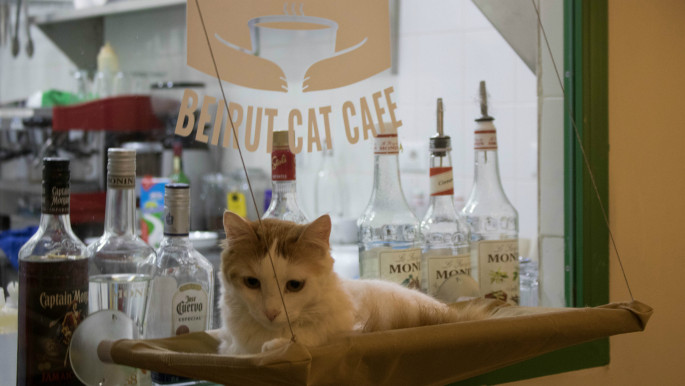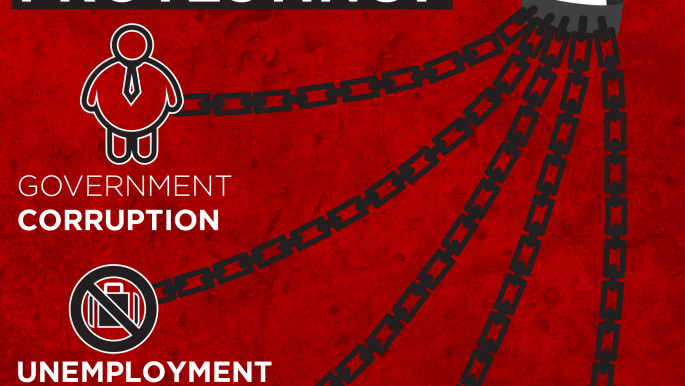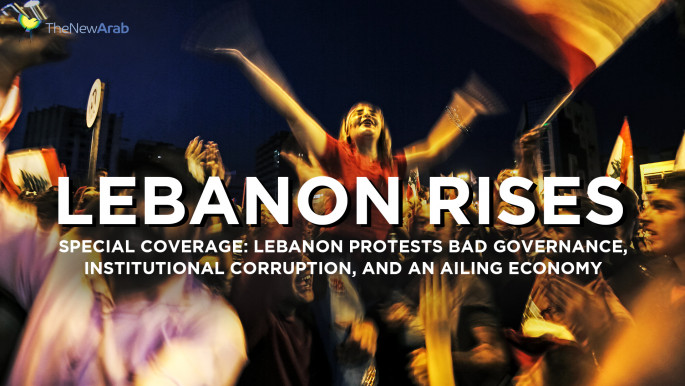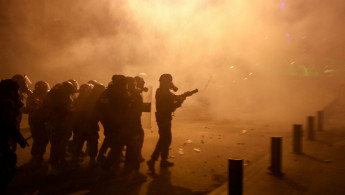'We will not be silenced': Journalists are also victims of Lebanon's security clampdown
Between 16 and 19 January alone, Lebanese security forces have assaulted more than 20 journalists and media workers who have been covering the protests that have broken out in Beirut.
While covering the angry protests outside the Helou Police Barracks, where dozens of protestors were detained, Reuters photographer Issam Abdallah was beaten over the head with nightsticks by riot police and taken to a nearby hospital to be treated for minor head wounds.
A few days later in downtown Beirut, security forces fired rubber bullets at protesters and media workers alike. Al-Jadeed TV photographer Mohammed Abu Samra was struck in the hand, and Al Jazeera Arabic correspondent Ihab al-Uqdah in the leg.
On Monday, an American journalist, Nicholas Frakes – a regular contributor to The New Arab – was also detained by security forces while covering protests in Beirut and handed over to the country's notorious military intelligence.
 |
|
| Read also: Businesses struggle as Lebanon's economic crisis continues |
Some tried to reason with riot police, but to no avail. Photojournalist Hasan Shaaban of The Daily Star was simply told, "f**k you and the [interior] minister", after he was threatened with arrest and the destruction of his camera.
Press freedom in Lebanon was already shaky, described as "partly free" by Freedom House, over the past decade, citing both the legislative framework in the country and restrictions on media workers. Reporters Without Borders has also expressed concerns about press freedoms in Lebanon.
Aside from attacks, activists and some independent journalists have decried, what they describe as, "media blackouts", particularly during of incidents of violence taking place in areas outside of Beirut.
Activists would share cellphone footage of these incidents, accusing broadcasters of deliberately not showing up to the scenes or the government and ruling parties from preventing journalists from entering.
 |
Activists would share cellphone footage of these incidents, accusing broadcasters of deliberately not showing up to the scenes or the government and ruling parties from preventing journalists from entering |  |
In one ear, and out the other
In response to incidents of attacks on media workers on 15 January, Caretaker Interior Minister Raya El-Hassan said that these attacks are "the exception, not the norm".
Attacks on journalists, at the hands of members of Lebanon's state security agencies, and their failure to protect media workers from attacks by other elements is not a recent phenomenon.
Assaults on journalists and media workers have in fact continued, despite El-Hassan's verbal condemnation.
Lebanon's Press Syndicate, which excludes freelance workers and others outside of Lebanon’s mainstream media, also condemned attacks on the press.
|
However, the syndicate – which is often seen as an idle bystander when journalists are harmed or deprived of their economic rights – was again subject to criticism in light of recent events.
Aouni Kaaki, president of the Press Syndicate since 2015 responded to a press conference by Internal Security Forces Chief Imad Othman, saying: "I don't [think] we journalists would accept any sort of rioting."
Al-Jadeed correspondent Layal Bou Moussa interrupted him, telling him not speak on behalf of all journalists. Kaaki’s response? "I think as president of the press syndicate, I can speak on your behalf."
The pen is mightier than the police baton
Soon, Lebanon will mark the 100th day of its uprising, amid declining economic conditions, inflation following US dollar shortages, and an ongoing political deadlock following caretaker Prime Minister Saad Hariri's resignation on 29 October.
With many major newspapers in Lebanon downsizing or closing for good, journalists are not immune from layoffs and pay-cuts that other citizens and residents are also facing due to the economic situation.
But during the uprising, many reporters have refused to be silent in the face of police violence.
Actions have been taken such as "de-arresting" peaceful protesters and media workers forcing their way past officers to allow apprehended protestors state their names on television.
This eventually translated to journalists and media workers organising an alternative syndicate, feeling that the existing one represents the interests of the political elite and not them.
The formation of the Alternative Press Syndicate has coincided with other efforts to build independent syndicates in the country.
The alternative syndicate held a brief demonstration outside the ministry of interior in Beirut, to protest ongoing attacks against journalists.
 |
Caretaker Interior Minister Raya El-Hassan surprisingly met the protesters, reiterating that she does not condone attacks on journalists.
But she upset the media workers at the demonstration by saying that riot police are tired and sleepless. "Put yourselves in their shoes," she said. "They're tired."
Like Lebanon's persisting socio-economic issues – from water cuts and electricity outages to a lack of adequate healthcare and education – its ruling class has failed to take any responsibility in protecting media workers from security forces, while reporting.
And while the response from El-Hassan and others insinuates that their cries have, yet again, fallen on deaf ears, it's clear that times are indeed changing.
Journalists and media workers will no longer be silent to abuse they continue to face and will take matters into their own hands, instead.
Kareem Chehayeb is a Lebanese writer and musician based in Beirut.
Follow him on Twitter: @chehayebk
The New Arab is covering the protests day by day, offering news updates, analysis, commentary and much more. Click on Special Contents page below and follow this regularly updated section for the latest on Lebanon's uprising:
 |
|
Follow us on Twitter and Instagram to stay connected



